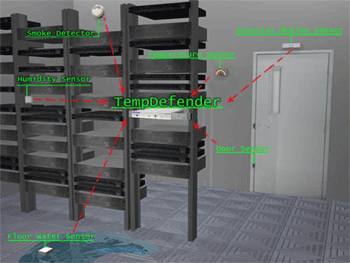Download our free Monitoring Fundamentals Tutorial.
An introduction to Monitoring Fundamentals strictly from the perspective of telecom network alarm management.
1-800-693-0351
Have a specific question? Ask our team of expert engineers and get a specific answer!
Sign up for the next DPS Factory Training!

Whether you're new to our equipment or you've used it for years, DPS factory training is the best way to get more from your monitoring.
Reserve Your Seat TodayEnvironmental conditions like temperature and humidity can cause severe damage to your gear. Protecting your valuable equipment should be priority number one. Without the right monitoring system in place, you're leaving your valuable equipment at risk for serious damage.

Temperature and humidity monitoring can prevent expensive damage to your gear. This preserves network uptime, protects your revenue, and ensures you won't have throngs of angry customers ready to take their business elsewhere.
To help you get started with choosing the right system, here are the 7 most frequently asked questions about temperature and humidity monitoring.
Smaller and more powerful processors are being packed into smaller units than ever before. This ultimately leads to your equipment generating more and more heat. If you're not properly cooling your server room or data center, you could be exposed to serious damage. Overheating can cause thermal shutdowns (at best) and severe damage (at worst). Either way, your network will be down, disrupting service and costing you valuable revenue.
While humidity threats aren't as common, they are no less severe. Excess humidity can cause condensation to build up on the circuit boards of your gear, causing components to rust and deteriorate. If the humidity is too low, your gear runs the risk of short-circuiting from static electricity.
It's nothing new that water and electronic equipment don't get along. If water is present in your server room, you're at risk of some serious damage. Another critical condition is airflow. With the excessive amount of heat generated, it's essential to have adequate airflow to cool your equipment. Airflow sensors can detect disruptions in the airflow and alert you, helping you prevent a thermal shutdown.
It certainly will not! Think of a temperature and humidity monitoring system as a good investment: you invest a little up front, then sit back and reap the rewards of your savvy decision. Implementing your own monitoring system doesn't have to be expensive, and by preventing just one network outage, it will pay for itself several times over.
Not much, actually! The right system won't take a skilled technician to install and it won't take an engineer to configure. A good monitoring system will feature a simple plug 'n' play design and an easy-to-use graphical web interface. These tools allow you to have total control managing your network - with none of the headaches.
Consider yourself lucky. Each year, a majority of the server rooms and data centers will experience some kind of threat from environmental conditions. Even if you've been fortunate to be emergency-free, you shouldn't wait till you experience one to start monitoring. Being proactive and staying on top of your network is the only way to guarantee you can prevent a network emergency.
Temperature and humidity monitoring don't have to be a hassle, and it definitely doesn't have to be expensive. Just imagine how much easier your job could be if you were monitoring all of the critical environmental conditions. Picture the peace of mind knowing if there's ever a threat to your gear, you'll be the first to know.

Monitoring your network is a serious job that requires a serious solution. That's why I recommend the TempDefender IT. This device is compact, easily rack-mounted, has 8 discrete alarms and 4 analogs (daisy-chainable up to 16), provides 24/7 alerts to your phone or email, and comes standard with world-class 7x24 tech support. This device is built to tackle your tough monitoring needs.
Call 1-800-693-0351 or email sales@dpstele.com to talk to the monitoring specialists at DPS Telecom. The DPS Sales Engineers can answer all of your questions - no matter how tough or technical - and help you design the right system to monitor your network. Just tell us about your monitoring needs and we'll help you make the right choice.